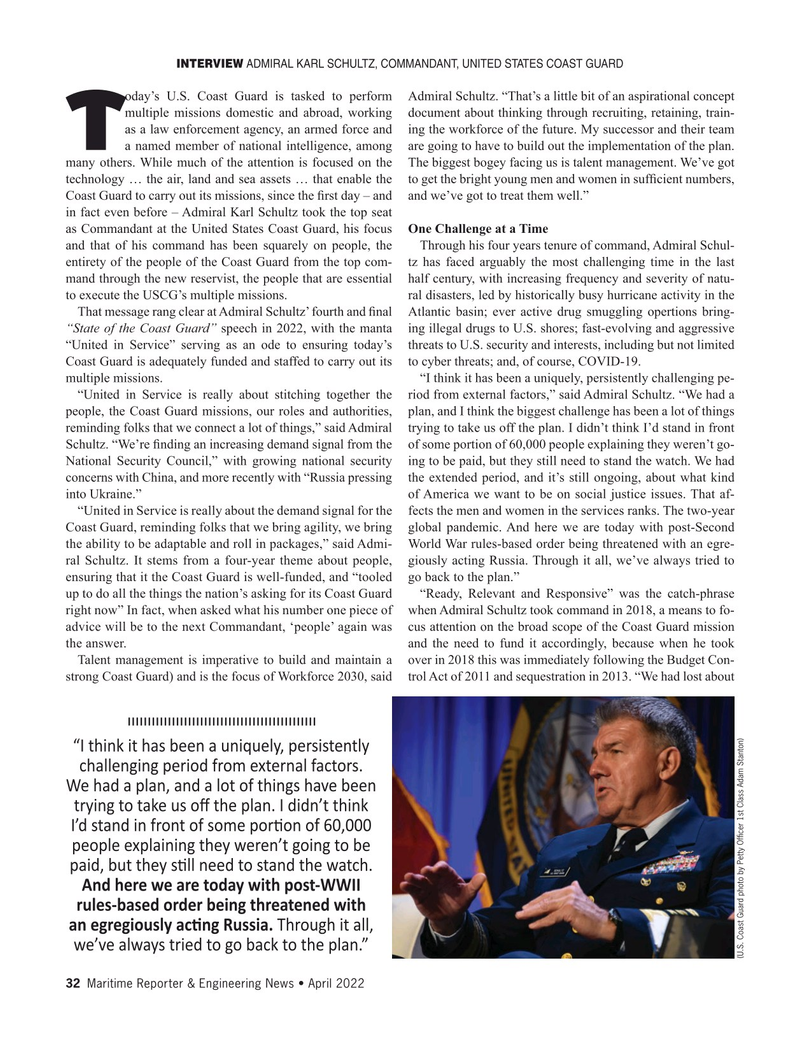
Page 32: of Maritime Reporter Magazine (April 2022)
Offshore Energy
Read this page in Pdf, Flash or Html5 edition of April 2022 Maritime Reporter Magazine
INTERVIEW ADMIRAL KARL SCHULTZ, COMMANDANT, UNITED STATES COAST GUARD oday’s U.S. Coast Guard is tasked to perform Admiral Schultz. “That’s a little bit of an aspirational concept multiple missions domestic and abroad, working document about thinking through recruiting, retaining, train- as a law enforcement agency, an armed force and ing the workforce of the future. My successor and their team
Ta named member of national intelligence, among are going to have to build out the implementation of the plan. many others. While much of the attention is focused on the The biggest bogey facing us is talent management. We’ve got technology … the air, land and sea assets … that enable the to get the bright young men and women in suf? cient numbers,
Coast Guard to carry out its missions, since the ? rst day – and and we’ve got to treat them well.” in fact even before – Admiral Karl Schultz took the top seat as Commandant at the United States Coast Guard, his focus One Challenge at a Time and that of his command has been squarely on people, the Through his four years tenure of command, Admiral Schul- entirety of the people of the Coast Guard from the top com- tz has faced arguably the most challenging time in the last mand through the new reservist, the people that are essential half century, with increasing frequency and severity of natu- to execute the USCG’s multiple missions. ral disasters, led by historically busy hurricane activity in the
That message rang clear at Admiral Schultz’ fourth and ? nal Atlantic basin; ever active drug smuggling opertions bring- “State of the Coast Guard” speech in 2022, with the manta ing illegal drugs to U.S. shores; fast-evolving and aggressive “United in Service” serving as an ode to ensuring today’s threats to U.S. security and interests, including but not limited
Coast Guard is adequately funded and staffed to carry out its to cyber threats; and, of course, COVID-19.
multiple missions. “I think it has been a uniquely, persistently challenging pe- “United in Service is really about stitching together the riod from external factors,” said Admiral Schultz. “We had a people, the Coast Guard missions, our roles and authorities, plan, and I think the biggest challenge has been a lot of things reminding folks that we connect a lot of things,” said Admiral trying to take us off the plan. I didn’t think I’d stand in front
Schultz. “We’re ? nding an increasing demand signal from the of some portion of 60,000 people explaining they weren’t go-
National Security Council,” with growing national security ing to be paid, but they still need to stand the watch. We had concerns with China, and more recently with “Russia pressing the extended period, and it’s still ongoing, about what kind into Ukraine.” of America we want to be on social justice issues. That af- “United in Service is really about the demand signal for the fects the men and women in the services ranks. The two-year
Coast Guard, reminding folks that we bring agility, we bring global pandemic. And here we are today with post-Second the ability to be adaptable and roll in packages,” said Admi- World War rules-based order being threatened with an egre- ral Schultz. It stems from a four-year theme about people, giously acting Russia. Through it all, we’ve always tried to ensuring that it the Coast Guard is well-funded, and “tooled go back to the plan.” up to do all the things the nation’s asking for its Coast Guard “Ready, Relevant and Responsive” was the catch-phrase right now” In fact, when asked what his number one piece of when Admiral Schultz took command in 2018, a means to fo- advice will be to the next Commandant, ‘people’ again was cus attention on the broad scope of the Coast Guard mission the answer. and the need to fund it accordingly, because when he took
Talent management is imperative to build and maintain a over in 2018 this was immediately following the Budget Con- strong Coast Guard) and is the focus of Workforce 2030, said trol Act of 2011 and sequestration in 2013. “We had lost about “I think it has been a uniquely, persistently challenging period from external factors.
We had a plan, and a lot of things have been trying to take us o? the plan. I didn’t think
I’d stand in front of some port on of 60,000 people explaining they weren’t going to be paid, but they st ll need to stand the watch.
And here we are today with post-WWII rules-based order being threatened with an egregiously act ng Russia. Through it all, we’ve always tried to go back to the plan.” (U.S. Coast Guard photo by Petty Of? cer 1st Class Adam Stanton) 32 Maritime Reporter & Engineering News • April 2022
MR #4 (18-33).indd 32 4/5/2022 10:46:39 AM

 31
31

 33
33
